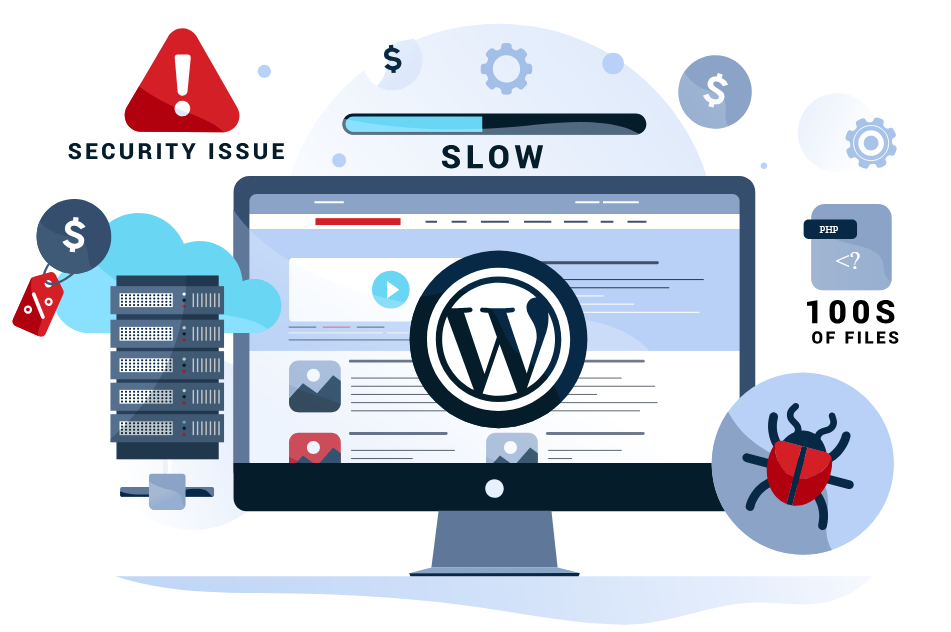
In recent times, many WordPress is facing ongoing issues with WP Engine, a popular hosting provider, causing frustration for website owners and developers. For some, these problems may be a tipping point to explore other options. While WordPress remains a dominant platform, it’s not the only choice out there. Let’s explore some alternatives to WordPress that offer flexibility, power, and unique features suited for different website needs.
1. Wix: Simplicity Meets Design Freedom
For users who want a website builder that’s easy to use without technical expertise, Wix is a great option. Wix offers drag-and-drop functionality, making it simple for beginners to create beautiful websites without needing to write a single line of code. Here’s what you can expect:
- User-Friendly Interface: The drag-and-drop builder is intuitive and easy to navigate, ideal for users looking for a quick, straightforward website creation process.
- Design Flexibility: Choose from over 500 professionally designed templates or start from scratch.
- Built-In Features: With built-in tools like SEO support, marketing integrations, and an app store, Wix provides everything you need to get started right away.
- Limited Scalability: While Wix is great for small businesses, personal websites, or portfolios, its scalability can be limited for larger websites or more complex projects.
Overall, Wix is a solid choice for those looking for simplicity and design flexibility in one place.
2. Squarespace: Aesthetic Design for Creative Professionals
Squarespace is another popular alternative that stands out for its design quality. It’s widely used by creative professionals like photographers, artists, and small business owners who value visually stunning websites. What sets Squarespace apart?
- Beautiful Templates: Squarespace is known for its high-quality, professional templates that are mobile-responsive right out of the box.
- E-Commerce Capabilities: It offers seamless integration with e-commerce features, making it a good option for small businesses looking to sell online.
- Comprehensive Tools: Built-in analytics, SEO, and email marketing tools give you everything you need to manage your website’s success.
- More Structure, Less Flexibility: Squarespace doesn’t offer as much customization as WordPress or platforms like Wix, which can be a downside if you’re looking for more control over your site’s design.
For those who want to focus on aesthetics and ease of use, Squarespace is an excellent choice, especially for creative-focused websites.
3. Webflow: Design Freedom with Powerful Backend Features
If you’re a web designer or developer who wants design freedom without giving up control over the backend, Webflow might be the perfect platform for you. Unlike Wix or Squarespace, Webflow combines visual design with a powerful CMS (Content Management System) that can cater to more complex needs.
- Design Flexibility: Webflow allows complete control over your website’s design using a visual canvas, perfect for designers who want pixel-perfect websites.
- Built-in CMS: Webflow’s CMS is designed for ease of use, making it great for content-heavy websites like blogs, portfolios, or news sites.
- No Code, But With Customization: While Webflow allows users to build without writing code, developers can also dive into custom HTML, CSS, or JavaScript when needed.
- Steeper Learning Curve: Webflow’s flexibility comes with a learning curve, making it more suitable for users with some design or development background.
Webflow offers the perfect balance between a website builder and a powerful CMS, ideal for designers who want complete control.
4. Ghost: A Minimalist Solution for Blogging
For those who focus on content creation and publishing, Ghost is a strong contender. Originally designed as a blogging platform, Ghost has grown into a powerful tool for creating content-driven websites. Here’s what makes Ghost a great alternative:
- Speed and Performance: Ghost is lightweight and built for speed, which helps websites perform better in terms of loading times and SEO.
- Simple Interface: Its editor is minimalist and distraction-free, focusing entirely on content creation.
- Subscription Features: Ghost has built-in subscription and membership features, allowing you to monetize your content easily.
- Limited Customization: While it’s great for content-first websites, Ghost doesn’t have the broad range of customization or plugins that WordPress offers.
If your website is centered around blogging and content, Ghost can offer a seamless experience without the extra baggage.
5. Joomla: A Versatile CMS for Advanced Users
Joomla is a content management system (CMS) that, like WordPress, is open-source and highly flexible. It’s a great choice for users who need a powerful platform but may want to move away from WordPress. Joomla is well-suited for complex websites, including e-commerce, membership sites, or extensive blogs.
- Advanced User Features: Joomla offers more built-in features than WordPress, making it great for users who need more complexity and control.
- Scalable: It’s robust enough to handle large websites, making it ideal for businesses that are planning to scale.
- Extensive Extensions: Joomla has a large library of extensions for additional features, similar to WordPress plugins.
- Higher Learning Curve: Joomla can be difficult to learn for beginners, as it’s more complex than platforms like Wix or Squarespace.
For those who want a feature-rich platform without the reliance on WordPress, Joomla is a strong contender.
6. Shopify: Best for E-Commerce
If your focus is e-commerce, Shopify is a dedicated platform designed specifically for online stores. While WordPress offers e-commerce through plugins like WooCommerce, Shopify provides a streamlined experience for building, managing, and scaling your online store.
- E-Commerce Focused: Everything about Shopify is optimized for selling online, from product management to payment gateways.
- Ease of Use: Setting up a store is quick and easy, with user-friendly interfaces and powerful features.
- Third-Party Integrations: Shopify has extensive third-party app support, allowing you to extend your store’s capabilities.
- Monthly Costs: Unlike open-source platforms, Shopify operates on a subscription model, so users will need to pay monthly fees.
For businesses focused on e-commerce, Shopify simplifies the process and offers a range of tools specifically designed to grow your online sales.
Why Señor Techie Recommends Exploring Alternatives
While WordPress has long been the go-to solution for many web projects, the ongoing issues with WP Engine may make it the right time to evaluate your options. Different platforms offer different strengths, and it’s crucial to pick one that fits your unique needs.
At Señor Techie, we specialize in providing web support and development services. If navigating these platforms seems overwhelming, we’re here to help you choose the right one and ensure your website runs smoothly, no matter which solution you select.
Each platform offers its unique strengths, and the best choice depends on your project’s specific needs—whether it’s ease of use, design flexibility, or e-commerce support. As WordPress faces ongoing challenges, exploring alternatives like Wix, Squarespace, Webflow, or Shopify may lead you to a more tailored solution.
If you’re not sure where to start, Señor Techie can help you assess your options and find the best platform for your project. Let’s chat about your goals and get your website running smoothly!
